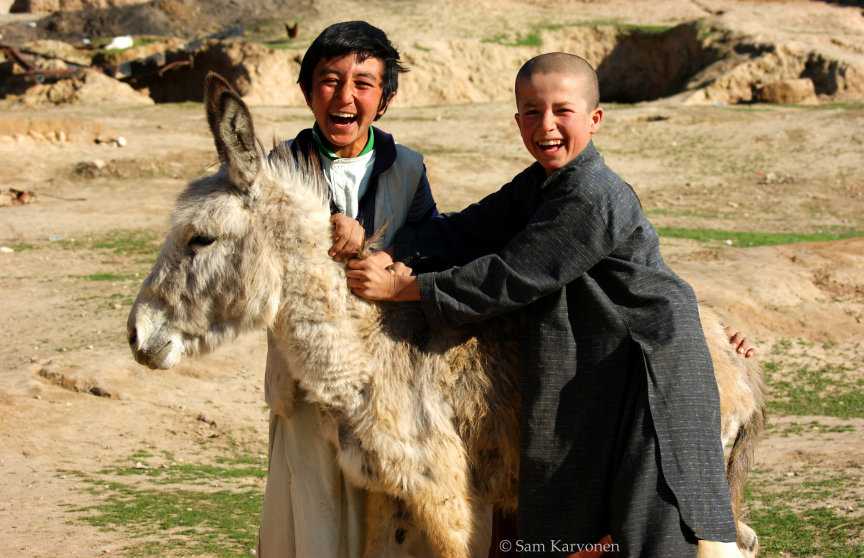Highlighting Australia
- As a proudly Australian initiative, we’re excited to showcase a collection of Australian stories, music, tributes and more.

Join activities, celebrations, study groups, spiritual empowerment and education programs for young people, and more.
Baha’i beliefs address essential spiritual themes for humanity’s collective and individual advancement. Learn more about these and more.


The glowing smiles of poorly-clad children in the winter of the Hindu Kush have penetrated indelibly into my consciousness. The radiant faces of one-toothed grandfathers in Ethiopia and Kenya have stayed with me for years.
In the West we pride ourselves in our “high” standard of living. Clean running water, electricity and a general semblance of order ensure a level of comfort which the emperors of bygone ages would have begrudged. But has it all come at the expense of smiles? Beamy-faced selfies are no doubt the fad for presidents and celebrities alike. But what’s with the polished faces, the bleeched teeth and the seductive poses if they lack heart and soul? A sincere smile is a many-splendored thing. The kind that is radiant and innocent rather than pretentious and pasted on the face.
The well-nigh miraculous rags-to-riches story of Finland, my native land, has (for now) climaxed in a prosperous and organized high-tech society which many Finns are proud of. But have all these great benefits banished the welcoming smiles towards strangers which the Italian explorer, Giuseppe Acerbi, reported witnessing on the soot-covered faces of the dirt-poor Finns at the end of the 18th century? Have they overthrown, in their wake, a sense of higher purpose from a gritty struggle for survival, sober cultural values and a gravitation into deep thought, stimulated by silence and serene nature, which once provided the Finns with a profound sense of meaning? No, I’m not on some sanctimonious mission to glorify the bliss of poverty or to awaken the world’s rich to the evils of wealth. Neither am I suggesting that a society where everyone isn’t happily grinning every minute is deprived of all mirth and gaiety. Things don’t have to look Disney to be great. But if the final fruit of “development” is really a grandmother living all alone in a comfortable inner-city apartment without any visitors, or an IT consultant with children going through a difficult divorce, is it ultimately worth the loss of a large, loud and closely-knit family that leads — in spite of a boiling stew of material and social problems — an essentially happy little life in a shoebox?
Anybody can be happy in the state of comfort, ease, health, success, pleasure and joy; but if one will be happy and contented in the time of trouble, hardship and prevailing disease, it is the proof of nobility.
‘Abdu’l-Baha
Of all the “developing” countries I’ve visited and worked in, Afghanistan left me the deepest imprint. Regardless of ethnicity, gender or age, most Afghans display uncanny fortitude, friendliness and hopefulness. The initially grim countenances of bearded men often enshroud an exceedingly polite gentleman whose child-like curiosity knows no bounds. Yes, the Afghan women wear the infamous burqa more often than not, but quite regardless of their attire, they often prove chatty, loud and even bossy epitomes of human grit. Behind their submissive masks lie cheerfully chattering exemplars of tenacity. Depressed and downhearted faces are a rarity albeit by Western reckoning virtually every Afghan ought to suffer from some sort of dire privation, lack or repression.
Afghan hospitality is historic. Families are large and lively. Despite the evident ills of inequality, most family relations are tight and caring. On fridays families retire to crowded parks for picnic and fellowship. Kite-flying children and youngsters abound in towns and villages. Not only women and girls but also men are visibly child-loving. While many Afghans have witnessed unspeakable crimes against humanity from earliest childhood, they have time and again proven surprisingly gentle in demeanour, soulful and sober-minded. Large families, great communal bonds, a staunch faith and a brutal sense of humour have provided a stronghold for many, shielding them from complete psychological breakdown. Lesser traumas in “more developed” countries have driven scores for life-confinement in the loony bin.
The greatest inspiration has ever come from those that remained happy even in the face of violent persecution and torture. The very mention of Badí and Mullá Husayn stirs us to our depths. The greatest souls seem to have suffered like none other. Despite their ability to attract masses, how can well-fed gurus basking in admiration within the safety of their extravagant ashrams, honey-tongued opportunists inviting generous donations by abusing religious sentiment, urbanized oracles selling self-help books with a fluffy spiritual philosophy, and privileged preachers flying their learjets between jam-packed stadiums, inspire us to triumph under agonizing trials?
Indeed, happiness under hardship is the mark of a true prophet. And not just any kind of hardship, but the devastating kind that targets your loved ones, destroys your body and gives you a rude reminder that you are really nothing but a spit bowl for the most twisted-minded oppressor. Baha’u’llah – robbed, tortured and imprisoned for life – experienced some of the most brutal aspects of humanity and yet remained utterly unwavering, till His hour of death, in His call upon mankind to rejoice in the greatness of its true calling. With the stubbornness of a Hebrew prophet He never stopped insisting that within the human frame “are potentially revealed all the attributes and names of God to a degree that no other created being hath excelled or surpassed”.
It took an inspired Orphan with a stammering speech, hunted by a pharaoh, to motivate millions of Jews to remain happy under the worst of hardships. It needed a spirit-filled homeless Carpenter destined for crucifixion to instil a deep sense of joy in the daily grind amongst hundreds of millions of devout Christians. Only an Illiterate ablaze with passion, driven out into the desert with a war thrust upon him and his companions, could inspire over a billion Muslims to remain contented and patient in the tumult that is life.
True prophets, in the annals of world history, are a mere handful. But they are real. And the lesson of their living example is near-identical: You, my friend, have a far, far greater calling than comfort.
Who is to be preferred, he that hath sheltered himself behind curtains, or he that hath offered himself in the path of God?
– Baha’u’llah
"*" indicates required fields

We recognise their continuing connection to land, waters and community. We pay our respects to Aboriginal and Torres Strait Islander people and their cultures; and to elders both past and present.
The views expressed in our content reflect individual perspectives and do not represent authoritative views of the Baha’i Faith.

Visit the site of the
Australian Baha’i Community
and the Baha’i Faith Worldwide
Notifications
What a way to close a post – great stuff Sam!
Collis (January 1, 2015 at 3:00 AM)
Beautifully written and humbling article!
Carol Campbell (January 1, 2015 at 7:27 PM)
You caught my attention when Ethiopia was mentioned and you completely had my attention when I read your homeland is Finland. Finding myself serving humanity in that special land after only finding Bahaullah a year before, 1972, in San Diego, California….I was feeling more at home among my Finnish classmates in Jyvaskyla. I still sing in your amazing mother tongue and would love to return for another four months…forty years have been too long away. But like you the new winds have sent me to other corners of the earth…seven years from 80-87 to experience the crumbling of apartheid in South Africa while sharing my new field as a Music Therapist, which I learned about in our beloved Suomi. Returning to the USA, we settled near the mother temple of North America shared by the Bahais for the unifying of humanity. Having learned of Dance/movement Therapy while in Africa I strove for an advanced degree desiring to return to Zululand to share my findings. Instead I remained in America to help it recover from 9/11. My dream to serve in Mexico and embrace the beauty of their indigenous cultural folkloric music and dance while these people still hide in the mountains, holding onto their simple ways that are harmonious with the environment, still a dream and yearning having attend high school and teachers college only miles and steps to my goal. I am still longing to go there and am again finding myself an hour north do Mexico yet closer to my roots of my mother’s father who is of the Jaqui tribe that fled the province of Sanora into Tucson, where my grandparents met before settling in Oklahoma City, where my grandmother felt so out of place and left, returning to Tucson to give birth to her only child, my mother, where her family were cattle ranchers and had fought for grazing land against the now infamous Poncho Villa and his banditos, who were sheep herders.That seemed to be the major conflict in the early 1900s, though I did read in my great grandmother’s memoirs that my great uncles joined the KKK out of boredom, as it was the organized activity back then. No wonder my mother’s father was a family secret if they harbored such prejudice though my grandmother found solace in the Methodist church, where my parents met. Now look how you inspired me to remember my own story.
Anna Resendiz (January 1, 2015 at 1:22 PM)
After each shop, I take my groceries to the kitchen, put away the fresh and frozen, and begin the ritual of removing the taint of materialism from by food.
I take out my plastic ware containers, and fill them. No labels, just see through cereal made from various grains, simple visual food.
I dispose of the plastic liners in the trash, and flatten the boxes. Put away the cereal and with satisfaction think about the bounty of the system that gives me and my family pure and simple food.
My last step is to think about the miles removed I am from the bustle of the world, here in my kitchen, away ftom the blessed manufacturers, away from the commercialism that used to drive me. I have sanctified my home from the materialism and placed instead my food in the realm of physical food, my food, my pantry, my kitchen.
Many years ago, I read a story- scifi- that had the main character on the run because the system wanted him eliminated. His crime was he did not fit in the statistical set.
He was an anomaly and as such was creating a ripple in the data that ran the system.
He was a character in a story.
So am I.
But more, I can change me at will, say hello to the stranger with a smile, help someone spontaneously, change the system without tools or the sanction of any other organization other than my own heart.
I can effect and affect the heart of all men.
Just like you………Love ya!
Thanks for your story 🙂
John Luthy (January 1, 2015 at 12:04 PM)